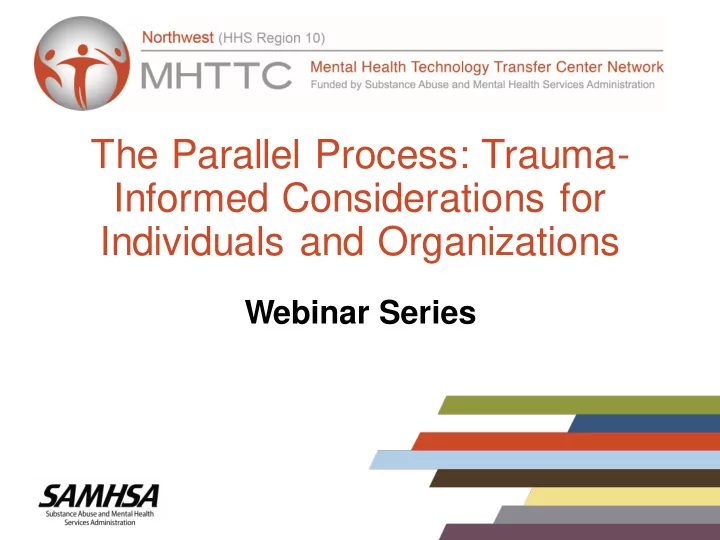

The Parallel Process: Trauma- Informed Considerations for Individuals and Organizations Webinar Series
This work is supported by grant SM 081721 from the Department of Health and Human Services, Substance Abuse and Mental Health Services Administration.
Northwest Mental Health Technology Transfer Center Our Role Provide training and technical assistance (TA) in evidence-based practices (EBP) to behavioral health and primary care providers, and school and social service staff whose work has the potential to improve behavioral health outcomes for individuals with or at risk of developing serious mental illness in SAMHSA’s Region 10 (Alaska, Idaho, Oregon, and Washington). Our Goals • Heighten awareness, knowledge, and skills of the workforce addressing the needs of individuals with mental illness • Accelerate adoption and implementation of mental health-related EBPs across Region 10 • Foster alliances among culturally diverse mental health providers, policy makers, family members, and clients
The MHTTC uses affirming language to promote the promises of recovery by advancing evidence-based and culturally informed practices.
Today’s Trainer Kristin Griffey, Peer Support Specialist and Traumatologist When human beings experience trauma and/or severe life stressors, it is not uncommon for lives to unravel. Empowering others to weave beautiful tapestries with their threads is one of Kristin’s greatest joys. Kristin is a mom, a friend and a fierce advocate who obtained her Personal History Degree (PhD) of lived experience in Portland and has polished her expertise with what she would consider “book learning,” that added Trauma Informed Care Specialist, Community and Workplace Traumatologist and Compassion Fatigue Specialist hats to her wardrobe. Kristin believes deeply in Trauma Informed Care and providing space for those who may be struggling with Compassion Fatigue.
The Parallel Process: Trauma- Informed Considerations for Individuals and Organizations
Peer Support takes on many forms such as Peer Wellness Specialist, Peer Support Specialist, Peer Employment Specialist, Certified Recovery Mentor, Certified Peer Counselor, and so on. For today’s webinar, we will use the term Peer Support Specialist to describe any and all of the aforementioned.
"Peer support is a system of giving and receiving help founded on key principles of respect, shared responsibility, and mutual agreement of what is helpful. Peer support is not based on psychiatric models and diagnostic criteria.” -Centre of Excellence in Peer Support
Compassion Fatigue is a safety concern for Peer Support Specialists and is sometimes referred to as “the cost of caring.” Compassion Fatigue = Burnout + Vicarious Trauma/Secondary Traumatic Stress and/or Moral Distress Having Trauma in your personal history increases your risk for Compassion Fatigue.
Where do the stories you carry go at the end of your day?
"Trauma - informed care is a strengths based framework that is grounded in an understanding of and responsiveness to the impact of trauma, that emphasizes physical, psychological, and emotional safety for both providers and survivors.” - Trauma Informed Oregon
There are 6 Guiding Principles to Trauma Informed Care: - Safety - Trustworthiness and Transparency - Peer Support (<<< READ THAT AGAIN!) - Collaboration and Mutuality - Empowerment- Voice and Choice! - Cultural, Historical and Gender Issues
“ A trauma-informed organization is one that recognizes the inherent vulnerability of all human beings to the effects of trauma and organizes system-wide interventions aimed at mitigating the negative effects of adversity and stress that are manifested in the clients served and the organization itself .” - Sandra Bloom
NOW WHAT?
The Parallel Process.
“The parallel process means we are only as good and generous and kind and sensitive to those we serve as our agencies are to us. The parallel process.” -Me (Kristin Griffey)
A Holographic Growth Process Implement and Monitor. Adopt Policy Gather and Practice. Information, Foundation, Prioritize and Readiness, Create Plan Recognition 5 Process and and Being the Infrastructure Awareness 4 best we can Trauma be (which is 3 Informed pretty Trauma friggin ’ 2 Responsive awesome) Trauma 1 Trauma Sensitive Aware
Implementation in action at MHAAO Peer Support for the Peer Supporter • Connection 101 • Compassion satisfaction group • Hot walk and talk • How to maintain the • Groups for peers fidelity of peer working in hospital support in crises settings
Commit to being trauma- informed! As an organization: As an individual: • Rather than ask the • Perform a trauma question “what is wrong informed self with this person?” ask the question “what has assessment happened to this • Train all staff in person?” trauma informed • Evaluate your own belief system in principles and the regards to trauma and impact of trauma have a supported, open conversation with your team.
Discussion
Get in Touch! Visit us online: www.mhttcnetwork.org/northwest Follow us on social media: @NorthwestMHTTC Email us: northwest@mhttcnetwork.org Find out about: • Upcoming trainings • New online trainings • Resources and Research Updates
Thank you!
Recommend
More recommend